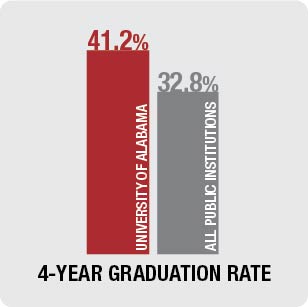“Students are encouraged to finish in four because financially it makes sense,” the Student Government Association vice president for academic affairs Laura Gregory said. “When you make the Finish in Four commitment, you can plan your college budget more accurately. Finishing in Four also gives students more post-graduation choices sooner. The University has done a great job providing the resources and knowledge necessary to help students accomplish that goal.”
SGA Director of Media Relations Mackenzie Brown said the SGA has in years past taken an active role in promoting the initiative, and they continue to encourage students to graduate in four years.
Interim Provost John Benson said it is too early to see the full effect of the Finish in Four initiative.
“Since the program was first initiated in 2011, the first cohort won’t graduate until 2015 so it is too early to quantify the impact,” Benson said. “Student comments indicate those who are in the program have found DegreeWorks to be very useful in planning their schedules and staying on track.”
Tyler Berryhill, a senior majoring in human environmental science, said he doesn’t usually make advising appointments. He said he doesn’t doubt the effectiveness of advising, but he has been able to choose classes on his own. Berryhill credits the DegreWorks program with making it simple to pick classes yourself.
“The biggest way that I know how they help people to graduate in four years would be the Degree Works program they have on MyBama,” he said. “It’s really self-explanatory, and it makes everything pretty clear based on the degree path that you’re pursuing.”
Torin Alter, the new director of advising for the philosophy department, said he is certainly aware of the goal of finishing in four while he is planning with a student.
“I just look at where they are and what their plans are and make sure they’re on track,” he said. “I might just steer them in a more efficient direction.”
Alter said some students spend hours in advising, while many students spend five minutes with their advisor or don’t attend advising at all.
“Some students want a lot of help, but that’s the exception,” Alter said. “Normally they want minimal help or no help. I just check over their schedules and if it makes sense, and it usually does, I approve it.”
Senior Katherine Amerson is graduating in four years with a bachelor’s and a master’s degree in economics through the University Scholars Program. She said she always attends advising.
“Of course, some students attend group signature sessions and do not get a personalized experience, but I have met with an advisor individually every semester that I have been on campus,” she said. “This planning really was an integral part of me being able to finish my degrees on time in terms of my scholarship and fit in a semester-long study abroad experience.”
Amerson said she has had a fulfilling relationship with her advisor. She also said being able to talk openly with an advisor is necessary to be successful in planning classes.
“An advising appointment is what you make of it,” Amerson said. “If you walk in the room and say, ‘This is what I’m taking,’ and stare blankly at an advisor, then maybe you might not be setting yourself up for a successful advising appointment. The same can be said for someone who walks in and says, ‘Plan my life for me.’ An advisor can tell you what you have to take, and perhaps what they think you should take, but the choice is ultimately yours.”
Amerson said she believes graduating in four years has less to do with the University and more to do with the students’ own motivation. She said it is easy to fall behind if you do not educate yourself on all the requirements put in place to receive a degree.
“Some students do not understand what they have to accomplish each semester to stay on track and very easily fall behind schedule,” she said. “Without knowing the requirements on your own or having an advisor show you the way, it is not difficult to make a mistake that could change how long you are in school.”
Doug Klutz, the internship and advising director for the criminal justice department, works with 800 to 1,200 students every semester to plan their schedules. He said he is well-versed in DegreeWorks.
“I think one of the big things that would help, in the long run, would be if a lot of these pre-majors that come in that are freshmen especially, if they would get to know their departmental advisor a little bit better,” Klutz said. “Because I tend to see kind of a trend now where a lot of younger students don’t come to see me until after sophomore year or so, and they miss out on learning about opportunities.”
Klutz said there are many reasons students get behind.
“A lot of students don’t understand that even if you meet all of those requirements on DegreeWorks, you still have to complete at least 120 hours for an arts and sciences degree,” he said.









